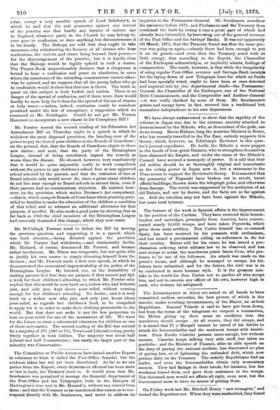The Committee on Public Accounts have issued another Report in
reference to what is called the Post-Office Scandal, but the evidence taken has not yet been distributed. As far as we can gather from the Report, every department affected has been more or less in fault, the Treasury most so. It would seem that Mr. Scudamore was permitted to manage the financial department of the Post-Office and the Telegraphs, both in the Marquis of Hartington's time and in Mr. Mousell's, without any control from them ; and that the Treasury so far sanctioned this course as to cor- respond directly with Mr. Scudamore, and never to address its inquiries to the Postmaster-General. Mr. Scudamore overdrew- his resources before 1871, and Parliament and the Treasury then condoned the fault by voting a sum a great -pirt of which had already been forestalled, by borrowing out of the general revenue of the Post Office and the Savings' Banks. It was not apparently till March, 1872, that the Treasury found out that the same pro- cess was going on again,—clearly there had been enough to put. it on its guard,—and even then the Treasury acted with so- little energy, that according to the Report, the Chancellor of the Exchequer acknowledges, or implicitly admits, feelings of compunction. The result, however, is that while the irregularity of using regular Post-Office revenue and Savings-Bank receipts for the laying down of new Telegraph lines for which no funds had been specially voted, ought to have been at once detected and inquired into by four departmental chiefs—the Postmaster-- General, the Chancellor of the Exchequer, one of the National Debt Commissioners, and the Comptroller and Auditor-General —it was really checked by none of them. Mr. Scudamores genius and energy have, in fact, secured him a traditional but. anomalous independence in his own department.


































 Previous page
Previous page